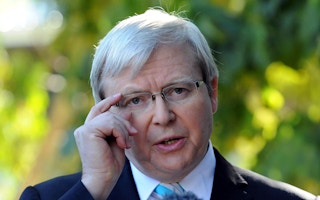The Green Building Council of Australia (GBCA) on Friday commended Prime Minister Kevin Rudd’s recent announcement to appoint a Minister for Cities for the country, should his Labor government be re-elected.
To continue reading, subscribe to Eco‑Business.
There's something for everyone. We offer a range of subscription plans.
- Access our stories and receive our Insights Weekly newsletter with the free EB Member plan.
- Unlock unlimited access to our content and archive with EB Circle.
- Publish your content with EB Premium.
This will be the first cabinet position of its kind in Australia, which the council has long requested for. Such a public official, according to GBCA, could spur strategic development for the nation in terms of sustainable urban planning – resulting in jobs, improved infrastructure and transportation, climate change resiliency and a well-managed population growth.
Robin Mellon, chief operating officer of GBCA, said, “We are pleased that our call for the appointment of Australia’s first Minister for Cities, with dedicated resources to help build Australia’s powerhouses, has been answered.” He added that they are also looking forward to a similar commitment from the Coalition party.
“A Minister for Cities will ensure a more integrated and collaborative approach to planning and delivery of critical infrastructure, and will drive the reforms needed to connect urban built environment policies and programmes across all levels of government,” Mellon explained.
“
A coordinated approach to urban policy development is required to meet Australians’ desire for sustainable, resilient and liveable cities, and to maximise the opportunities of our cities as drivers of Australia’s productivity and innovation
Robin Mellon, GBCA COO
Currently, cities account for 75 per cent of Australia’s total population of 22-plus million people.
Rudd, who is lagging behind in recent election polls in the key state of Queensland, said: “We have ministers for regional development, we have ministers for primary industries, but we do not have ministers responsible for our cities, the cities that generate around 80 per cent of the country’s gross domestic product and employ three out of every four Australians and that includes not just inner cities but vast expanses of outer suburban Australia, where the vast bulk of our national population lives, outer suburban areas that have their own unique planning challenges.”
According to GBCA, a re-elected Rudd-led government will establish an Outer Suburban Growth Taskforce. This administering body will see to the progress of outlying suburbs, addressing the limited job market, building better roads and easing transport congestion. The goal is to improve the overall liveability in the suburban region.
In contrast, Melbourne, the second most populated urban area in Australia, was recently recognised as the most liveable city in the world by The Economist Intelligence Unit. This is Melbourne’s third consecutive time on the list, and it is joined by three other Australian cities in the top ten – Adelaide (ranked fifth), Sydney (seventh) and Perth (ninth).
Building a better nation requires necessary budgetary needs, however, the council pointed out. To this end, the Australian Sustainable Built Environment Council (ASBEC) and the Urban Coalition, of which GBCA is both a member of, have also recommended starting an Urban Infrastructure Fund that will undertake the over AUD500 billion worth of accumulated infrastructure needs in the country.
The expansion of the Major Cities Unit under the Department of Infrastructure and Transport is another potential commitment. However, GBCA is still waiting for more details on this, said Mellon.
He added, “We are also still waiting for both [Labor and Coalition] parties to provide fully costed polices to support more sustainable cities and communities.”
“A coordinated approach to urban policy development is required to meet Australians’ desire for sustainable, resilient and liveable cities, and to maximise the opportunities of our cities as drivers of Australia’s productivity and innovation,” Mellon emphasised.
In other parts of the world, the United Kingdom and Brazil are two countries that have a Minister for Cities. Earlier this year, there was a call for United States President Barack Obama to establish a Department of Cities.










